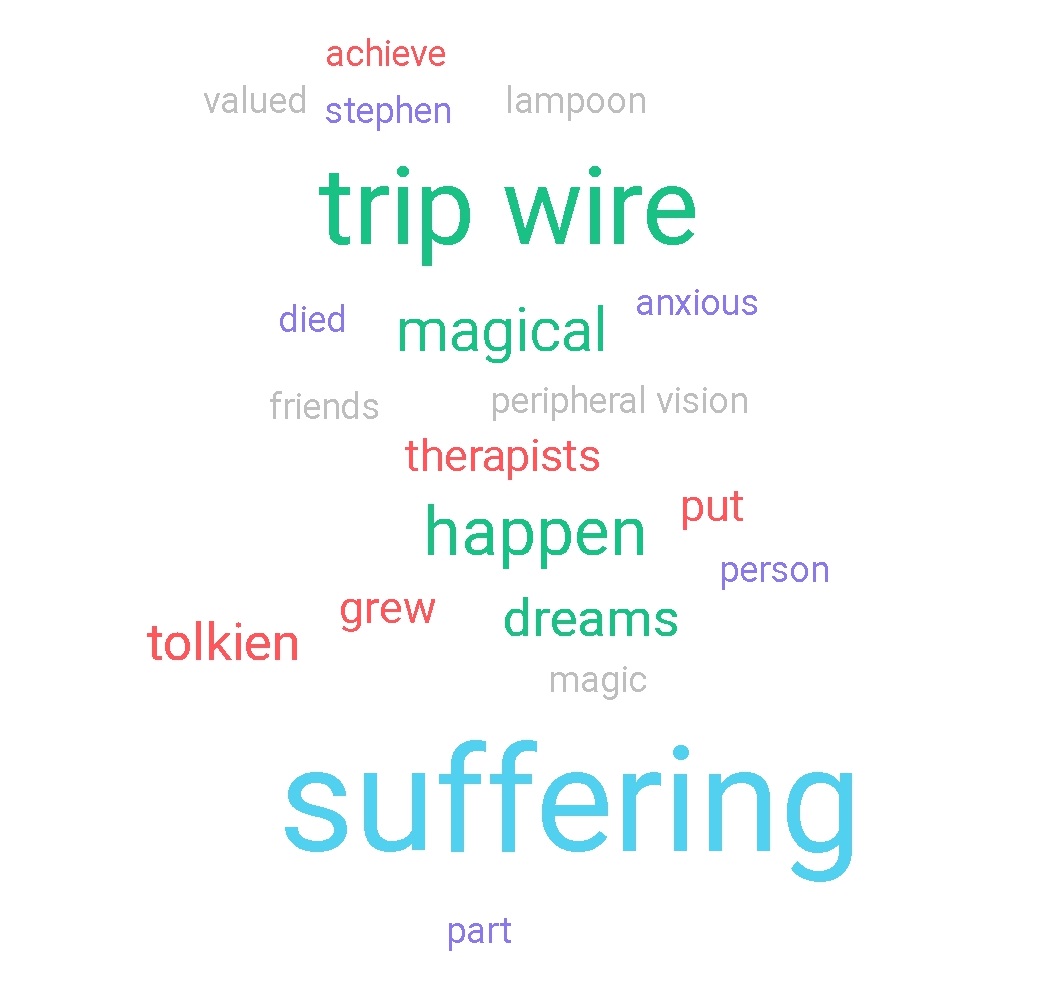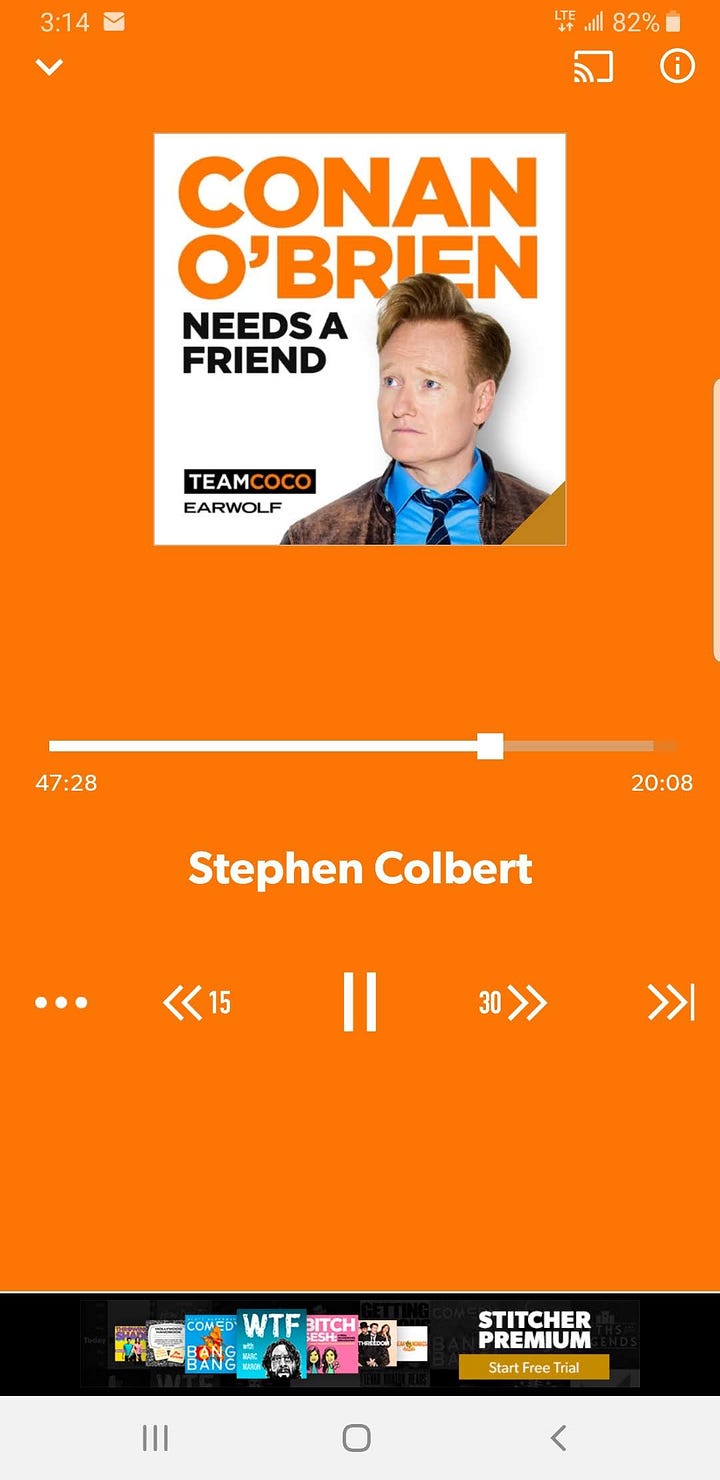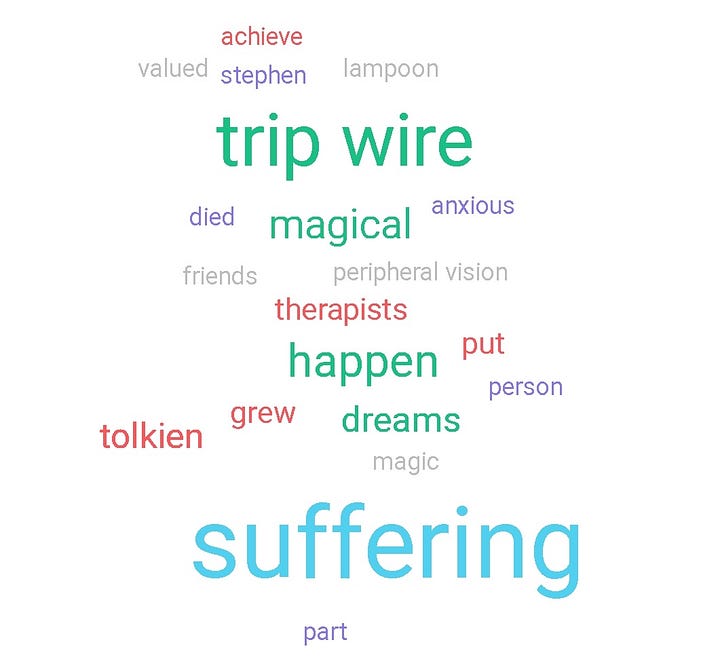
Stephen Colbert & Conan O’Brien on Religion & Spirituality
Cross-posted from Medium, as I try to maintain a daily writing habit.
This article follows yesterday’s piece about taking inspiration from podcasts.
Last month I listened to Stephen Colbert on Conan O’Brien Needs a Friend and was struck by their conversation about religion and spirituality. I clearly recall listening to it during an evening dog walk. The walk around my block takes around 15 minutes. It was dark out. I rewound and played and made my usual screenshot to capture the parts of the podcast that I wanted to reference.
Conan O’Brien has lots of friends.

Here are a few of my takeaways from this discussion:
1. The inherited feeling that one needs to suffer
Said O’Brien,
I believed that anything good had to come from suffering. I really believed that you have to be miserable.
So Colbert and O’Brien had a wonderful conversation about Catholic guilt and suffering like “Christ on the Cross.”
In expressing his agreement of O’Brien’s comments about suffering, misery and subsequent statements, Colbert replied,
I am also a Roman Catholic and 11-year altar boy, and very devout household and the image of Christ on the cross. The highest aspiration is to be able to take up your cross and to alchemize suffering into gold.
But you can’t have gold without suffering. As you know, to the point where I had a magical thinking. I had a magical thinking about suffering, and about forbearance and patience.
He continued to share that his brothers and father tragically died when Colbert was ten-years-old. He didn’t provide specific details, but I got some more information about this tragedy online:
On September 11, 1974, when Colbert was ten years old, his father and two closest brothers, Peter and Paul, died in the crash of Eastern Air Lines Flight 212 while it was attempting to land in Charlotte, North Carolina.
There was a long pause while Colbert gathered his thoughts — long enough that I wondered if there was something wrong in the playback or editing of the podcast — before Colbert acknowledged, “it would require enormous magic for that not to have happened.”
Such tragedy is enough to send anyone seeking answers, for more, for the meaning of life and such. But for a Catholic boy… as we Jews say, “Oy vey.”(It’s a Yiddish phrase expressing dismay or exasperation.)
Suffering
So many people think that they need to suffer, sacrifice or struggle in life and that their life isn’t worthy if they don’t. They believe that life shouldn’t be easy. It’s ingrained in them, whether they learned it from family or religion, or it’s inherited trauma. Or it’s real trauma, from losing close family in a plane crash.
Colbert recalls from his childhood, “I did hairshirt behaviour” to make the magic happen. A hairshirt is an uncomfortable shirt worn by some Catholics and, earlier, by Jews as a sign of penance.
I would do things like I would put myself in a small closet where the carpet had never been matted down. The 1970 shag, which is incredibly scratchy, and I put myself behind the boxes and close the door in the summer in Charleston where there was no air conditioning and see how long I could take it because that would be sufficient to prove -not even prove — it’s like a gathering of energies.
The suffering is a gathering of potency, that then you can use in other ways what that second thing was I have no idea what that action would be I don’t know, but it had something to do with crawling underneath the tripwire of reality, without touching it so that I could change. what is into something else, but I couldn’t even name it, because to name it would be to hit the tripwire. So, what could you do that doesn’t happen to make something else be.
Again, oy vey.
I’m a spiritual person, but I don’t understand all of this. I get the gist, but I’m not quite sure that I comprehend the “tripwire” analogy even though I know what a tripwire is. It’s thought-provoking, though.
2. “Magical thinking.”
In a dream world, it means turning back time. In a world of hope, it means creating a new reality. It means manifesting your destiny.
Said O’Brien,
I felt like I suffered through other things, and they felt very powerful to me. And I engaged in magical thinking and put myself through a lot of torture. And here’s the crazy thing what happens when you do that, and then magical things start to happen for you.
And here’s where I think that they’re talking about manifestation. O’Brien emphasized that he hates that it works. He hates that suffering leads to success.
Colbert:
How about this: ending up being a comedian or ending up doing what I do or what you do is not a singular goal that you must achieve. It’s just what happened because we engaged in many things.
In my notes, I scrawled “manifestation” next to this.
Colbert continued, “…and the magical thinking magically thinks that the magical thinking worked.”
**Manifestation.**
It perpetuates itself.
The magical thinking magically thinks that the magical thinking worked.
I highlighted that because I like it so much.
Through this, O’Brien and Colbert are still talking about suffering. Regarding all the people, including therapists, who have told O’Brien that suffering is not necessary,
And I 80% believe them. And 20% I’m like, “Yeah, what the fuck do you know?”
(They both laugh.)
Colbert responds to those people who have argued against suffering:
You know why you’re saying that? Because you can’t do it. You know why? Because you don’t know how to get underneath the tripwire. I shouldn’t even be telling you about the trip wire. What if the trip wire finds out?
That fucking tripwire again. Is “tripwire” his way of avoiding the word “God”? Could be, except that if you believe in the Judeo-Christian version of God, God is everywhere. Is the tripwire fate, as in, “tempting fate?” That seems more likely.
What IF fate finds out?
What if our deeper selves find out. What if our souls find out.

We lie to ourselves all the time.
We lie to ourselves all the time. This need for us to suffer, to be hard on ourselves, this belief that life needs to be hard. Does it, though? What if we told ourselves it was easy? I don’t mean in a sense-of-entitlement way, I mean in a way that would make the activities in life more joyful.
For example, I procrastinated writing this piece for several weeks. Had I jumped on it the day it inspired me, I would have written it in two days. However, I told myself that it was more than it was. Had I said to myself, “Just start writing, it will be easy,” it may have been easier. Instead, over a month after I listened to the podcast — nearly two months, really — I started the introduction that became my last post. Two days later, I opened the podcast and my transcription app, and let the app do its thing, then I exported the transcript into Evernote, edited it and starting typing away here. It did all flow, but the idea of getting started made me do other things first. It’s not the only post in my brain. (Total: 10 minute read.)
When we tell ourselves that an activity will be difficult, it’s more likely to BE difficult. When we tell ourselves it will be easy, it’s more likely to be easy.
That doesn’t always work. Several years ago I did some freelance work for a copywriting agency. The agency owner gave me an assignment and told me, “It will be easy for you. It’s right in your wheelhouse.” I thought, “Great, so I don’t need to start working on it until close to the deadline because it will be easy!”
Except it wasn’t, and I didn’t discover this under after I’d put it off, working on other projects in the meantime. I tried to wrap my head around this project, but the subject matter and the slang specifically to this industry in the UK didn’t come easy. Two days before the deadline I emailed the agency owner and admitted that I was having difficulty. I’d mistaken his faith in me as an absolute when I should have gotten going on it to see if he was right and whether I needed help. It was a learning experience, and nothing similar has happened since. Now, I always look at the subject matter and then decide whether or not to prioritize it.
The trick is to START.
Alchemy
While the word isn’t used much in this podcast discussion, it’s alluded to often.
“…there wasn’t something there and now there is, you know, that’s the thing I like to tell young performers who are anxious about their career. I go, you’re entirely sufficient to the challenges of what you want to do because the drive all comes from you. And the thing you’re going to ask yourself to do you know how to do it, where there was nothing, you will make something, and that thing will be you, you can’t ask for more.
In my notes the part emphasized was highlighted.
The drive all comes from you. Where there was nothing, you will make something.
It’s an inspiring statement.
I am making this blog post (sorry, Medium, this story) where there was a blank screen.
**Alchemy.**
Manifesting isn’t “magic” because it’s not actually sitting back and waiting for things to happen to you. It’s magic because it helps get you to where you want to go, while you do the work.
While a large part of manifestation is thinking it and imagining it to be true and feeling the energy of its completion before it that achievement, it works when we co-conspire with the Universe and work with the Universe as a team to get it done. When we genuinely want it, when we put the thought and energy into it, we’re most likely to take action. This is the real “Secret” — though it’s been a while since I’ve been familiar with that work, so my memory is unclear. I think that this is where people misunderstand the book (and other forms of) The Secret and Think and Grow Rich, and why the latter’s book title is, essentially, clickbait from the 1930s before there was bait to click. It was clever ad copy because of the promise of the cover title.
When I thought I wanted health coaching clients — ADHD clients — I didn’t get any. I put in a long of work and yet didn’t put in the correct effort, because I didn’t honestly want to attain that goal. I didn’t position myself where I needed to be. I kinda sorta hoped that people would find me. But they didn’t, and I realized that I hadn’t gone from not wanting clients to wanting clients. I never wanted clients. I tricked myself into believing that I did. (For more about that, scroll down to the section called “→Strutting Into 2019←” in this post.)
My lack of desire manifested a lack of clients.
Now I’m trying to manifest myself full-time income. Today I applied to a job that looks 100% perfect for me. I answered the questions. I did the work. And now, without suffering (although cover letters always seem laborious before I “just start”) I hand it over to the Universe and hope that magic happens.
From start to finish, my transcript from the first part that I wanted to take notes on ended up at 11 minutes and 11 seconds. 11:11 is significant. Some people believe that the actual meaning of 11:11 is a number sign that angelic beings are close by. Even people I know who don’t believe in angels or anything spiritual find themselves noticing 11:11 on the clock. I think that for anyone, four 1s can feel special. A quick Google tells me that,
11:11 is the number of masters who impacted humanity and shifted the vibrations of our earth throughout history. The ascended masters, like Buddha (Siddartha Gautama), Jesus Christ, and Quan Yin, are sending you the message that you are a divine aspect of the Creator, a master at being yourself in human form. You’re being reminded that you came here to make earth a better place for future generations.
(Source)
Magic. Have I tripped the wire?
3. Seeing ourselves the way we see others
There were three more minutes of conversation wrap up that I felt were significant.
O’Brien:
I have a very powerful feeling when you were talking about your suffering, I just hate that you had that. I hated that you had that suffering because you’re such a decent and good person. And it’s so interesting to me. I don’t know if you feel this way, but when people have ever said to me, “Oh, that sounds like you went through a rough time” or “you were unhappy as a kid,” I dismiss it. I say, “No, that was no problem. That was not a problem at all. But when I hear about someone else who is a kindred spirit, having any kind of suffering, I have this feeling of, “I want to go back and take that away for you.”
Sometimes it’s easier to show compassion and empathy toward others than toward ourselves, especially for those who have ingrained guilt and shame. One the most popular pieces I hear about combating negative self-talk is, “Talk to yourself the way you’d talk to a friend.” and “We’re never as hard on our friends as we are on ourselves.”
One of the way that I work through my own issues — and I’ve been doing this since childhood — is to ask myself, “What advice would I give someone else?” I don’t always want to take my own advice. Sometimes it’s a bitter pill to swallow, whether figuratively or literally.
Why are we likely to want to take away someone else’s pain while dismissing our own experience?
How we interpret the world around us is based on our own experiences, which is why we often don’t understand what we’re seeing and why children can’t grasp concepts that only life experiences can teach. Realities such as the long-term effects that childhood bullying have on self-esteem are not something you can demonstrate. However, as I said in a post from about a year ago, empathy and compassion can be taught.
We can take some of the pain of others away. We can alchemize. There is magic in all of us.
We need to, first and foremost, take responsibility for ourselves. We need to acknowledge that life has challenges, and that’s okay. Discomfort is okay. If we lean into it, we can turn it around. If we allow ourselves to experience it without forcing ourselves into further distress, it will all be okay.
A Catholic and a Jew walk into a bar and try to one-up each other about guilt. I hope that some of you are inspired.
The end.
Also, listen to O’Brien’s interview with Michelle Obama, who humanizes the White House. I very much enjoyed hearing her talk about how she couldn’t publicly discuss her human fears and insecurities because as First Lady, she couldn’t indulge that stuff at a time when parents lost their children to war. The FLOTUS needs to be stoic and all.
I just borrowed an e-book version of her latest from the library.
I take pleasure in hearing the Obamas swear.

